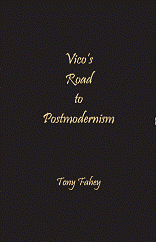|
Choice Publishing Book Store |

|
Vico‘s Road to Postmodernism
By
Tony Fahey
ISBN: 978-1-905451-91-3
Price €15.00
|
|
About the Book
Postmodernism is a post Second World War movement that is the natural issue of its progenitor, modernism. That is, where early twentieth century and post First World War ‘modern’ intellectuals held that it was their privilege and duty to restore order to a fragmented and chaotic world, post Second World war thinkers hold that since world order is an unachievable and therefore fruitless ambition, all humankind can do is make the best of what they have. One could say that where modernists attempted to put the shattered shell of Humpty Dumpty back together again following his tumble from the wall, postmodernists feel that all one can do is do what one can with the pieces. Postmodernism is also associated with a movement that arose when writers and thinkers, in the wake of Saussure’s revelation that the words we attach to things are purely arbitrary, turned their iconoclastic gaze on universal concepts or ‘grand narratives’. This book sets out to show that postmodern consciousness is not a recent phenomenon, but, as a critique of the fragility of the claims made by exponents of the notion of metanarratives or ‘universal concepts’, it is evident in the philosophy of the eighteenth century Italian philosopher, Giambattista Vico. The title of this book, ‘Vico’s Road to Postmodernism’, is something of a play on words of the theme that James Joyce, who, as will be shown, Ihab Hassan identifies as a postmodern thinker, took for his book Finnegans Wake. It seems that Joyce, who declared that his imagination soared whenever he read Vico, as a tribute to the Italian philosopher, begins the narrative of his famous novel at the Vico Road in the South Dublin suburb of Killiney. Not only is there a link between the name of this road and Giambattista Vico, but the view of Dublin Bay from this road is said to replicate the view of the bay of Naples, Vico’s native city.
About the Author
Tony Fahey graduated from DCU with a BA in Humanities (Philosophy and Literature). From there he moved to NUI Maynooth to complete his postgraduate studies. Whilst at Maynooth he taught philosophy at St Patricks College and Maynooth University. On completion of these studies he returned to DCU to teach philosophy with Oscail.
Sample Excerpts
Preface Postmodernism is a post Second World War movement that is the natural issue of its progenitor, modernism. That is, where early twentieth century and post First World War ‘modern’ intellectuals held that it was their privilege and duty to restore order to a fragmented and chaotic world, post Second World war thinkers hold that since world order is an unachievable and therefore fruitless ambition, all humankind can do is make the best of what they have. One could say that where modernists attempted to put the shattered shell of Humpty Dumpty back together again following his tumble from the wall, postmodernists feel that all one can do is do what one can with the pieces. Postmodernism is also associated with a movement that arose when writers and thinkers, in the wake of Saussure’s revelation that the words we attach to things are purely arbitrary, turned their iconoclastic gaze on universal concepts or ‘grand narratives’. This book sets out to show that postmodern consciousness is not a recent phenomenon, but, as a critique of the fragility of the claims made by exponents of the notion of metanarratives or ‘universal concepts’, it is evident in the philosophy of the eighteenth century Italian philosopher, Giambattista Vico. The title of this book, ‘Vico’s Road to Postmodernism’, is something of a play on words of the theme that James Joyce, who, as will be shown, Ihab Hassan identifies as a postmodern thinker, took for his book Finnegans Wake. It seems that Joyce, who declared that his imagination soared whenever he read Vico, as a tribute to the Italian philosopher, begins the narrative of his famous novel at the Vico Road in the South Dublin suburb of Killiney. Not only is there a link between the name of this road and Giambattista Vico, but the view of Dublin Bay from this road is said to replicate the view of the bay of Naples, Vico’s native city.
Chapter 2 From Heresy to Postmodernism
A recurring trope of Vico’s New Science is the view that individual consciousness does not frame social consciousness, but that social consciousness – the sensus communis - shapes individual consciousness. A recurring trope of philosopher Michel Foucault’s ‘postmodern’ approach (more of this is in chapter 4) is that disciplinary institutions constitute individual consciousness. In order to understand the societal influences that contributed to the shaping of his New Science this chapter turns to place Vico’s thesis within a historico-cultural context. That is, it turns to consider the city of Naples leading up to and including Vico’s lifetime in this his native city. Amongst other things, the term ‘postmodernism’ implies a questioning of orthodox theories, values, and beliefs - an examination of ‘grand narratives’. During Vico’s time the term employed for anyone daring to attempt such an approach was ‘heresy’. In the New Science Vico asserts that there are two histories of humankind: the sacred history of the Hebrews, and the history of gentiles or pagans. However, it becomes clear to the reader that, while Vico makes passing references to the former, his main focus of interest is on the history of the latter. This chapter also offers the view that the ‘two history’ paradigm set out in Vico’s New Science does not reflect his true position of the history of humankind, rather that it was a view put forward to avoid accusations of heresy by the Roman Inquisition or the Index of Prohibited Books.
|
